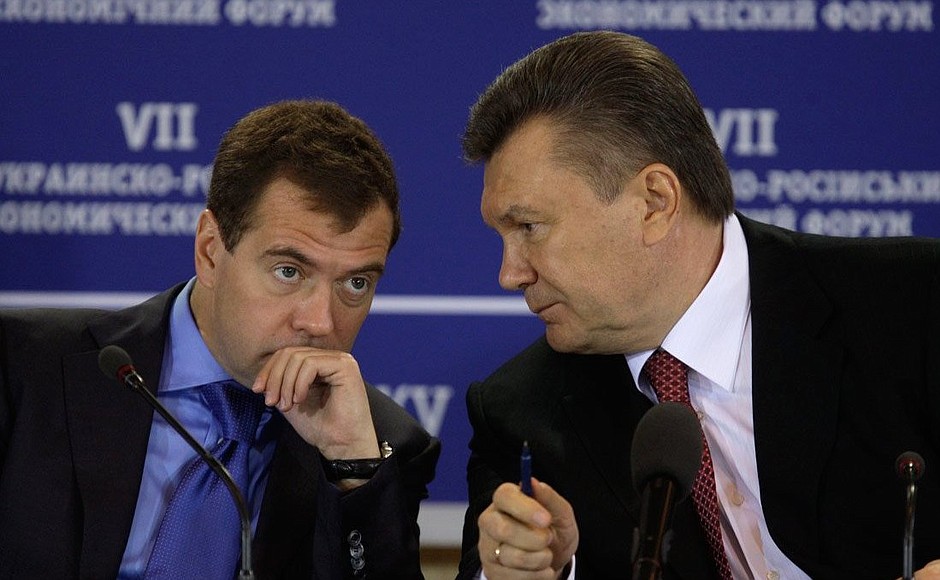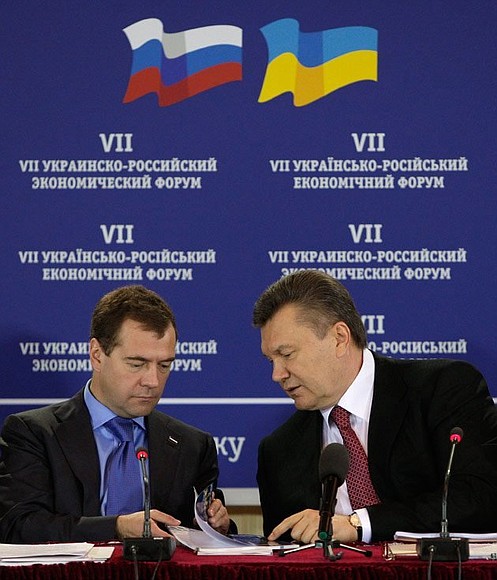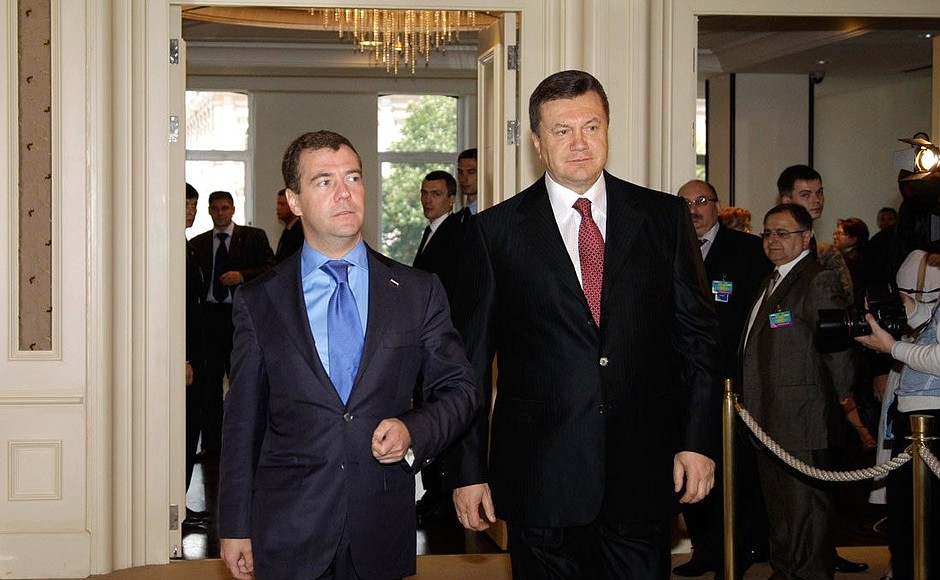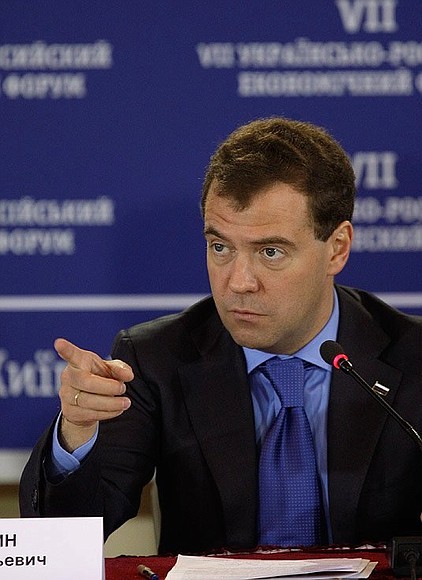President of Russia Dmitry Medvedev: Mr President, colleagues,
I have just arrived from a meeting with students from the National University of Kiev. There, responding to a question the students asked me about the immediate steps we should take in terms of Russian-Ukrainian relations, I said that first, we need to work on the economy, second, we need to work on the economy, and then, we need to work on the economy some more. Clearly, we have problems in other areas, which have accumulated over the recent years, but the economy is more important, and moreover, this is the area where we might have the most alarming problems. So, I am very happy that we are meeting today at a business forum like this and that it is finally taking place. I hope that it will result in very practical outcomes, because although it is nice to meet in order to see one another (I know many of the Ukrainian business community representatives here, and naturally, I know about their relations with our business representatives), it is even better to act and make progress.
Mr Yanukovych just gave a detailed analysis of what we have recently accomplished. I fully agree with him. The Russian-Ukrainian Interstate Commission has begun its work. I spoke about this yesterday, and today I would like to note that the commission is meeting only for the third time. We established it five years ago, or perhaps even more than that. This is only the third meeting, while it probably should have been its tenth or twelfth already, because if this mechanism is working, then it should be working, considering the relations between our nations, at least twice a year. The years lost are the years of wasted opportunities and mutual claims. Therefore, we need to do everything to ensure that we do not find ourselves in that situation again, but instead, that we reach a brand new level of cooperation as quickly as possible. We know what this means, so I won’t specifically mention it. Clearly, our cooperation covers all areas of our bilateral relations, including energy, mechanical engineering, banking, transportation, aviation, and defence sectors, and what we call the high-tech or new economy.
And so, we have things to work on, particularly given the crisis that the President of Ukraine spoke about. Indeed, the crisis has hit all companies, and the Russian and Ukrainian economies, too. Although we are noticing a certain revival, there are still some alarming trends on the global markets and the international financial market. And the European Union’s attempts to overcome their current difficulties generally demonstrate that the crisis is not over yet.
I will be attending the G8 and G20 summits in June, and in this connection I would like to say that, given the restoration of full-fledged relations between Russia and Ukraine and the renewal of strategic dialogue, I would like to rely on the common approaches at the G8 and G20 meetings. Russia is ready to defend our consolidated approach to configuring the global financial system. I think that this is very important, especially since it also represents an opportunity for Ukraine to participate in these discussions, at least indirectly, through Russia’s representatives.
What’s most important is that we must lay the foundations for the future. After all, Russia is still among the main investors in Ukraine’s economy, ranking fourth after Cyprus, Germany, and the Netherlands. With Cyprus and the Netherlands, we know what kind of jurisdiction and what kind of investment we are talking about. Indeed, often, they are investing in themselves. And clearly, Germany is a major investor, while Russia is in fourth place.
But speaking about the future, I feel that Russia could become the number-one investor, and not because of any geopolitical reasons, but simply because our economies are very close. And indeed, we are very closely connected. Therefore, as of January 1 the volume of Russia’s direct investment, which currently stands at 2.7 billion dollars, is good, but at the same time, not that much. Here, I think we have another matter to discuss.
We agreed to develop joint projects in all areas, and we will do this. Ukrainian businesses are also working on the Russian market, and they, too, are quite active and aggressive. Direct investments may not be as high as they should be; based on our calculations, they make up about 165 million dollars. Nearly half of that money goes toward the manufacturing sector and one third is directed toward the financial sector, which demonstrates the same distortion I spoke about. I think that if we had taken the right steps to develop cooperation between our economies in recent years, if we had not wasted any opportunities, then these investments would have been bigger.
What should be done to make them bigger? We need to clear the logjams of the past. I have already spoken to Mr Yanukovych about this today. I said that we are ready to work on it, because claims are always mutual. But if I am to speak absolutely sincerely (taking into account the size of our investments and what is being cautiously referred to as political instability in Ukraine) it is nevertheless clear that Russia has had some rather significant risks and claims associated with that period. Incidentally, the President of Ukraine and I agreed that I will prepare a special memorandum on this matter and pass it on to him. I think that our Ukrainian partners can do the same with regard to the Russian market. Here, we really need to act directly and openly, without shying away from anything, especially since we are truly partners and we currently have friendly relations. Thus, I’m addressing all Russian business representatives present here today. I have some information, but I want to update it and pass it on to my colleagues.
We still need to do a great deal to improve the investment climate in Russia and here in Ukraine. Clearly, what’s most important is to minimise the risk for investors. We know what to work on, we know our weak spots; we are aware of the flaws in our economy, the problems with our law enforcement and judicial systems. If we are able to structure all of this properly, we will have fewer of these problems. No one can promise that they will disappear immediately, but there will certainly be less of them. And specific suggestions can be made to improve tax, customs, banking, and insurance legislation – in other words, the legal framework we need to develop full-fledged economic ties. We will certainly work on this.
As for the question of how to do this work: we have our commission, we have a business forum, we have ministries and departments, and we have other platforms that can be used, including the interregional forums mentioned by the President of Ukraine. It is true that we have agreed to meet in Krasnodar Territory this year and later in Donetsk region.
I would also like to say that we are open to the most sincere and direct dialogue with our Ukrainian partners and business representatives. We understand what we are looking at. We are all working in Europe. Mr Yanukovych said that Ukraine is ready to develop relations with the European Union, including associate membership. Naturally, this is Ukraine’s sovereign decision on how to develop its contacts with the European Union.
Our relations with the European Union – I mean the Russian Federation’s relations — in some areas are even more serious than just association, because trade turnover between Russia and the European Union is approximately 250 billion dollars. I would like to point out that unfortunately, Ukraine’s turnover with the EU is only 23 billion, but I hope that this year, it will grow to 35 or 40 billion. Still, you can see the difference.
What does this mean? It means that we must jointly think about the integration mechanisms in our relations with the European Union, which is very important to us, given that both our economies are oriented toward Europe and given the European identity of our nations. But at the same time, we must look at cooperation options along other integration tracks – naturally, with due regard to volumes and conditions that our nations deem acceptable. And so, I would like to say that Russia is ready to discuss cooperation with Ukraine on other integration platforms, including the Common economic space and the Customs Union – again, if this is appealing or necessary.
I would like to say again that I am very happy to finally have this kind of meeting. I hope that it will be productive and direct. I count on our colleagues to express what they think about ways to develop business cooperation in this new setting, since it is indeed new.
* * *
I will try to say a few words based on what has been stated. In my view, the speeches here were both specific and brief, which is really good. And nearly all the areas that were addressed in these speeches show promise for growth and opportunities for cooperation between our nations.
In talking about technological development, I agree: we need to move on both in terms of innovations and in terms of 4G network cooperation. We have some good practice in this area in our nation, so it would also be good if we could join efforts on matters related to new innovative clusters. Let’s wait and see. If you feel that we can integrate Crimea and Skolkovo, we certainly won’t object. What’s most important is for all of it to yield results, to work and make head.
I would like to warmly support the statements made by our bankers regarding the involvement of our Ukrainian partners in working to create an international financial centre in Moscow. It is true that we are working on this very actively. I have met with CEOs of the world’s largest banks and I am dealing with this matter personally; I held a special meeting. We would like to accelerate this process. We worked on this earlier as well, but we feel that now, as we overcome the global financial crisis, this may be the very moment when it will be easier for us to discuss certain issues with the global financial community, as well as the major players. Thus, if our partners are interested, then we would certainly be happy to have them join our discussions of the topic. We could even find a special proxy to work on this on behalf of Ukraine and have him or her included in our working group. Because we understand that if we create a centre like this in Moscow, we would like our closest neighbours and business partners to participate.
And the topic of settlements in national currencies is also relevant. Wherever I go nowadays, whatever nation I’m visiting, I always bring this issue up. Last time, I discussed this matter in Turkey, and before that, I discussed it with a number of other nations. China is actively working on it, as you already know. I think that we need to think about strengthening this component of our financial relations. At some point, this really could insure us against complications and problems related to the exchange rate of the dollar, the euro, and other currencies. This does not mean that these problems are simple and that we will not face any difficulties at all, but it is worth talking about.
We are also ready to work on the issue of energy exports and power industry reform, especially if our experience can be helpful.
Our projects, the ones my colleagues mentioned, particularly the one mentioned by Sberbank’s CEO, the so-called electronic social card, is an interesting thing. I am certain that Ukraine will also switch to such solutions. We are ready to share our experience, and perhaps even work on some kind of joint product, because ultimately, this is the future. It is clear that very soon, every resident in Russia and in Ukraine will have a card like that, and we simply need to identify the right kind of platform. So, I think that it would be interesting to join efforts here as well. In any case, we are making this shift; I have introduced special laws on this matter, and I think that some of them have already been passed and are coming into force. We will continue working in the areas that our colleagues brought up.
To answer the question about cooperation with Central Asian nations, including Uzbekistan, and the options of subsequent transit of gas purchased [from Central Asian countries] through the Russian territory, — you know, this is an on-going issue, but it’s never a bilateral topic – it’s always trilateral. Ultimately, it rests upon our agreements with our Uzbek partners or other colleagues, for example, Turkmenistan. This is one thing. And second, we have had a whole set of arrangements on this issue. Not all of them withstood the test of time, and as President, I will not support all of them, but we can certainly discuss this issue. It is not closed yet. I just want to note though that this must be mutually beneficial. It must fit into Russia’s current strategy for developing gas sector and gas exports.
In terms of aircraft manufacturing industry, everything here is clear and right. I think that on our own, we are unlikely to have many prospects for developing this cluster. We are ready to renew our cooperation in regard to models and machines I spoke about yesterday and which our colleagues mentioned, including the An-124, An-140, and a number of others. We simply need to move forward.
I have already spoken about various exchange operations or involvement in gas transportation.
Speaking about gas cooperation in general, I do not think that this is the right place to look into these matters. Our companies – namely, Gazprom and Naftogaz of Ukraine – will certainly continue their discussions. Naturally, there will also be discussions between the energy ministries. But at the same time, I do not think that I will reveal anything new, since you were talking about so-called bypass routes, South Stream and Nord Stream. But, colleagues, these decisions have been made, and this is not a matter of sympathy or antipathy on our part, or any other political issues. These decisions have been made, and they are being implemented, both in the north and in the south. Therefore, there’s certainty, though someone here spoke about uncertainty; still, this does not mean that alternatives are no longer possible. Neither I nor my colleagues have ever gotten hung up on anything or stated that if we have a pipeline in one place, it is impossible to discuss any other alternative. Indeed, they certainly can be discussed. The world is changing, and the power industry is changing too. We now have shale gas, LNG [liquefied natural gas] is developing at full force, and facilities are being built. Five years ago, nobody was really even thinking about it, but now, people are. And the energy mix will change as well. So let’s continue discussing these issues.
In general, I feel that today, we have done some very positive work in terms of discussing specific issues, and even more importantly, we have demonstrated that we are together once again and that we are again ready to do real business instead of producing empty talk on this issue and calling for mutual investments. I am very happy. Let’s continue this trend.



